10 Vegan High Protein Breakfast Ideas
NUTRITION AND DIETS / WRITTEN BY KELSEY MOORE, REGISTERED DIETITIAN
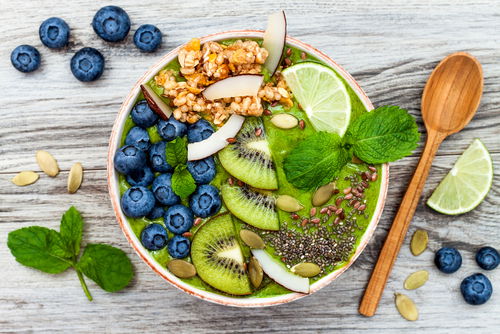
Are you struggling to find a balanced vegan high protein breakfast?
Whether or not you follow a plant-based diet, there are many reasons you may be looking to add more plant-based foods to your diet.
If you are curious about adopting a plant-based diet, we’ll teach you what it is and what nutrients are essential and also give you some easy breakfast recipes.
Keep reading to learn about ten easy vegan high protein breakfast meal ideas.

What is a Vegan Diet?
A vegan diet is a diet that excludes any animal food sources. A plant-based diet typically consists primarily of only plant foods. However, people on a plant-based diet may or may not eat plants exclusively.
For this article, we’ll use vegan and plant-based interchangeably as all our recipes contain no animal or animal by-products.
Essential nutrients on a Vegan Diet?
Vegan or plant-based diets tend to be lower in certain vital nutrients when not monitored correctly.
Here is a list of the top six nutrients that are crucial to look out for on a vegan diet.
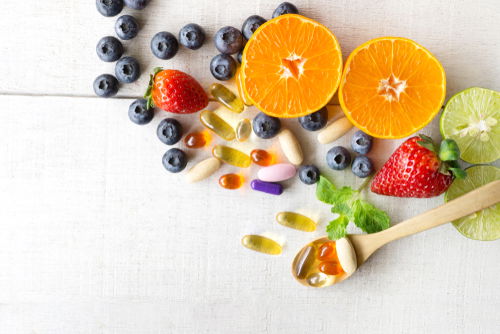
VITAMIN B12
Typically, vitamin B12 is found in animal-based food sources like eggs, meat, fish, and dairy products. Thus, on a vegan diet, you need to be particularly aware of ensuring you’re getting enough vitamin B12 in your diet.
Vitamin B12 is vital for forming red blood cells and brain function. A B12 deficiency can lead to a lack of energy, cognitive changes, and a lack of balance and coordination.
You can find vitamin B12 in fortified foods like nutritional yeast and plant milk from plant-based sources.
Since there are limited plant sources of B12 in foods, we strongly recommend consuming a daily B12 supplement to ensure you meet your needs.
IRON
Iron plays a vital role in our body as it helps with red blood cell formation and oxygen delivery to our cells. Iron deficiency can result in anemia, which leads to low energy and fatigue.
Iron from plant-based sources comes from
- Tofu
- Beans
- Legumes
- Leafy greens
- Nuts
- Seeds
Iron comes in two forms, heme and non-heme iron. Heme iron is the type of iron found in animal products and is easily absorbed in the body. Non-heme iron can be found in plant sources and is less easily absorbed.
Since plant sources aren’t absorbed as well, here are some things you can do to increase absorption:
- Consume your iron-rich foods with a source of vitamin C
- If taking an iron supplement, avoid taking it with calcium supplements, calcium-rich products, or coffee and tea
We recommend regular testing for iron deficiency when following a vegan diet. Iron deficiency is prevalent among those who are menstruating, athletes, and vegetarians/vegans, so it’s important to get tested if you fall in one or more of these groups.
VITAMIN D
Vitamin D helps maintain our bones and teeth, absorbs calcium, and plays a role in our immune health. Vitamin D Deficiency can result in rickets (abnormal bone formation in kids), or osteoporosis (porous bones) in adults.
Best vegan sources for vitamin D include
- Plant-based milk
- Margarine
Always read the label and look for foods that contain 45% or more of vitamin D. Vitamin D content will vary widely across products.
Food sources alone aren’t typically high enough in vitamin D to meet your daily needs, so you need to get vitamin D from non-food sources. Your bodies can make sufficient vitamin D from the sun from April to September. You can also get vitamin D from supplements.
Extended periods of direct sun exposure can increase your risk of skin cancer. Thus, we recommend meeting your vitamin D needs mainly in supplemental form.
During the winter, 2000IU daily for a healthy adult will likely meet your needs. During the summer months, consider a vitamin D supplement of 1000IU daily.
CALCIUM
Calcium works with vitamin D to help build, maintain, and repair bones.
Did you know that you achieve peak bone mass (the most amount of bone) by your early to mid-20s? Thus, you must ensure you get enough calcium before these years and also as you age to maintain your bones.
Plant-based sources of calcium are harder to come by, but with the proper knowledge, you’ll be able to meet your calcium needs easily.
Here are some good vegan sources of calcium:
- Calcium set tofu
- Plant milk fortified with calcium (aim for 300 mg/serving or roughly 30%)
- Almonds
- Broccoli
- Sesame seeds
- Black strap molasses
Depending on your biological makeup and age, you should aim for 2-4 servings of calcium-rich sources daily.
ZINC
Zinc is essential for bodily functions like metabolism, immune support, wound healing and DNA formation. Although less common, zinc deficiency can include stunted growth, slow wound healing, and impaired cognition.
You are at a higher risk of developing a zinc deficiency if you are vegan as plant sources of zinc contain less zinc per serving on average than their animal-based counterparts.
Here are some common plant sources of zinc:
- Beans
- Lentils
- Tofu
- Wheat germ cereal
- Heart of palm
- Pumpkin seeds
- Cashews
- Hemp seeds
- Quinoa
- Almonds
If you are consuming a variety of these foods regularly, you are likely meeting your needs.
Although zinc supplementation is often unnecessary, there are certain cases where one may be required, such as with digestive diseases or healing from a large wound. You should always seek medical advice before taking a zinc supplement.
OMEGA 3S
Omega 3s are an essential fatty acid, meaning your body cannot make them itself and must get them from food sources.
Omega 3s role in the body:
- Brain health
- Immune support
- Fighting inflammation
- Heart Health
When it comes to plant-based sources of Omega 3s the conversion is less efficient to the usable form of Omega 3 in the body. Thus, you need to consume plant sources of Omega 3 daily to meet your needs.
Here are some examples of servings of Omega 3’s from plant-based sources:
- 1 tbsp. Flax oil
- 1 tbsp. Ground flax
- 1 tbsp. Chia seeds
- 2 tbsp. Hemp seeds
- 2 tbsp. Walnuts
Protein on a Vegan Diet?
Protein is essential for many vital functions in the body. These include:
- Growth in children
- Brain development
- Muscle repair
Getting enough protein on a plant-based diet can be tricky, but it is possible if you know which foods are high in protein.
You want to aim for 20-25 grams of protein per meal. These amounts will vary depending on your specific needs. Always speak to a Registered Dietitian about meeting your protein needs.
Sources of Vegan Proteins
Here are some protein sources you can include in your vegan high protein breakfast:
- Tofu
- Beans
- Lentils
- Tempeh
- Seitan
- Nuts/nut butter
- Seeds/seed butter
- Some plant milks like soy, and pea protein milks
- Some wheat bread
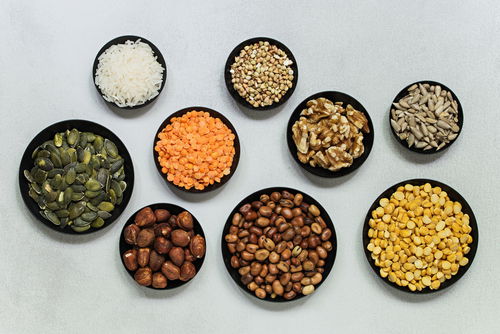
For tofu, beans, lentils, tempeh and seitan, typically 100g or ¾ -1 cup is a large enough serving of plant-based protein for an average healthy individual.
When it comes to nuts, seeds, milk and wheat products, you’ll need 2-3 servings to meet your needs.
Here is an example of what 20-25 grams of a vegan high protein breakfast looks like:
- Two slices of high protein bread
- 2 tbsp. Nut butter
- One glass of soy milk
Add a piece of fruit, and you have a well-balanced meal!
Why is Protein at Breakfast Important?
Whether you are vegan, flexitarian or a meat-eater, protein at breakfast is important.
Think of protein as the anchor to your meal. It helps to stabilize your blood sugar levels and provides you with fullness and satisfaction. Also, research shows that having protein at breakfast may help curb cravings later in the evening.
Typically most people get enough protein at lunch and dinner, but breakfast tends to lack. Getting enough protein at breakfast helps you to meet your overall protein needs for the day, as protein is not something you can consume in just one or two sittings to meet your daily needs.
Our bodies can essentially absorb limitless amounts of protein. However, only so much can be used at once; the rest is used as energy or stored as fat. Uptake varies per person, but typically, 20-30 grams in a 2-4 hour window for a healthy adult is the maximum uptake rate.
Hence, It is crucial to space your protein out throughout the day to ensure you are meeting your daily needs.
Plant-based protein sources can be more challenging to get enough of, especially at breakfast, if you do not know which meals are high in plant-based proteins.
With this in mind, here are some vegan high protein breakfast options to help you meet your needs
1. TOFU SCRAMBLE
Tofu scramble is a plant-based take on scrambled eggs using firm tofu as the main ingredient and protein source.
Tofu is a soy-based protein source and soy-based protein is an excellent source of protein as it contains all of the essential amino acids (building blocks of protein) you need to meet your needs daily.
Tofu, particularly firm or extra firm, is high in protein and easy to cook. It is also high in other important vitamins and minerals like
- Vitamin A
- Iron
- Zinc
- Calcium (if set with calcium, always check the label)
- Magnesium
- Manganese
- Copper
Check out this tasty Tofu Scramble recipe. Pair this vegan high protein breakfast with a slice of toast and mashed avocado for a balanced meal.
2. PROTEIN PANCAKES
Pancakes are an excellent vessel for adding extra protein.
One way to add protein to your pancakes is by choosing your favourite plant-based protein powder. However, if you’re not a fan of protein powder, try vital wheat gluten.
Vital wheat gluten is the protein component found in wheat flour. In just ¼ cup, it packs 20g of protein!
Try using vital wheat gluten in these easy Protein Pancakes.
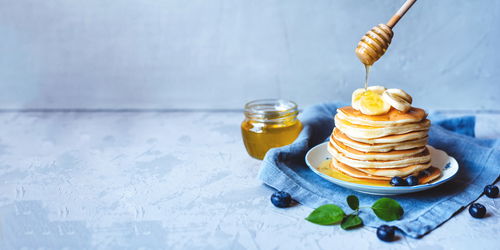
3. BEANS ON TOAST
When it comes to plant-based meals, beans are a staple. Beans are both a good source of protein and fibre. Both protein and fibre help to keep you fuller for longer and help prevent blood sugar spikes. Try this simple Maple “Baked Beans” recipe:
Pair ¼ of the Maple Baked Beans with a slice of high protein toast (5 grams or more of protein per slice) and spread your toast with chimichurri or vegan butter. Add sundried tomatoes and 1 cup sautéed kale or spinach for added fibre.
4. PROTEIN SMOOTHIE
A protein smoothie is another way to bump up the protein content of breakfast. Protein powders will be your best bet to get enough protein in your smoothie.
Plant-based proteins often contain some fibre as well as vitamins and minerals. However, they are not as well absorbed as dairy-based protein powders, so try adding 1.5x the amount or include a few tablespoons of nut butter with one scoop of protein.
Here is a simple smoothie formula you can use:
- 1 cup plant-based milk
- 1 scoop plant-based protein powder
- 1 large frozen banana
- ½ cup frozen fruit of choice
- 1-2 tbsp. nut or seed butter
- 1 handful of spinach (optional)
- 1 tbsp. cacao powder (optional)
- 1 tbsp. ground flax seed (optional)
Typically, smoothies are too low in overall calories to have as a stand-alone meal. We recommend pairing it with a high-fibre muffin or a slice of avocado toast.
5. EGG MUFFINS
Thought you couldn’t have eggs on a vegan diet? Now it’s easy! JUST Egg is a new plant-based egg on the market that can be used as an easy egg replacement.
The main ingredient and protein source in JUST Egg comes from mung bean. Per 100 ml, it has a whopping 12 grams of protein!
Try our in-house Vegan Savoury Breakfast Muffins. With added tempeh and nutritional yeast, these muffins have the extra protein boost you need to start your day.
We recommended having 2-3 muffins with a potato hash or a whole grain bagel if you’re eating on the go!
6. BREAKFAST COOKIES
Dessert for breakfast? Why not! Breakfast cookies made with ingredients like oats, nut butter, applesauce and whole wheat flour can help to boost the overall nutritional content.
Here are some high protein ingredients you can add to your homemade breakfast cookies:
- Chickpea or almond flour
- Peanut butter (or other nut or seed butter)
- Nuts (like walnuts or pecans).
Try these Chocolate Vegan Protein Cookies and pair two of these cookies with a glass of plant-based milk and 1-2 pieces of fruit for a well-rounded breakfast that will keep you going throughout the morning.
7. BREAKFAST WRAP
Need a vegan high protein breakfast on the go? Try a breakfast burrito or two!
This Ultimate High Protein Breakfast Burrito breakfast wrap has 20 grams of protein and includes protein from various sources like tofu, black beans, walnuts, and the tortilla.
Burritos are an easy way to add plant-based proteins. Here are some other protein sources you can add to your breakfast burrito:
- Chickpeas
- Tempeh
- Smoked Tofu
- La Tortilla Factory High Protein Wrap
8. HIGH PROTEIN OVERNIGHT OATS
Overnight oats are a simple way to create a vegan high, protein breakfast.
Start with your base of oats and fruits, then add in two of these high-protein options to make an easy high-protein overnight oats recipe:
- Soy milk or Ripple (pea protein-based milk), 8 grams of protein per 250 ml
- Nuts or seeds (add day of), 8-12 grams of protein per ¼ cup
- Nut or seed butter, 6-8 grams per 2 tablespoons
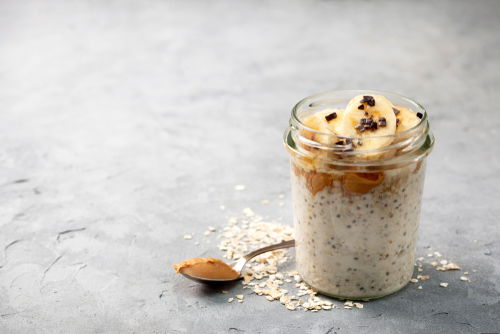
9. CEREAL
Typically, cereals tend to be low in protein, but we know how you can boost the protein content to make it a high-protein vegan breakfast:
Include a plant-based milk with at least 8 grams of protein per 250ml serving. Some great options:
Some other kinds of plant-based milk that are moderate in protein:
- Not Milk (pea-based)
- Earth’s Own Oat Milk (oat-based)
Other ways to add protein to your cereal:
- Nuts (2 tablespoons)
- Almonds
- Pecans
- Walnuts
- Seeds (2 tablespoons)
- Hemp
- Ground flax
- Chia
- Pumpkin
Or, you can opt to buy a vegan high protein breakfast cereal and add a high protein plant-based milk. Here are some brands that have about 10 grams of protein
10. NUT BUTTER AND TOAST
Nut Butters are a source of protein and heart-health promoting fats. Try this formula for a high protein vegan breakfast idea.
- 2 tablespoons nut or seed butter
- Almond
- Pumpkin
- Peanut
- Pecan
- 2 slices high protein toast
- 1-2 tablespoons of hemp hearts (sprinkled on top)
Here are some kinds of bread that contain five or more grams of protein per slice.
Wrap-Up
A Vegan diet can be a healthy diet. However, like any diet, it’s important to ensure you meet your key nutrition needs. Pay attention to vitamin B12, iron, vitamin D, calcium, zinc, and Omega 3.
If you are having trouble navigating your nutritional needs, consider speaking to a Registered Dietitian who can support you in meeting these needs.
As discussed, protein is a crucial nutrient for everyone, particularly those on a vegan diet, as plant-based protein sources are often lower in overall protein.
Although breakfast is one of the most challenging meals to get enough protein in, it is also one of the most important meals to start your day on the right foot. Follow our simple tips for getting enough plant-based protein at a meal and enjoy these easy vegan high protein breakfast ideas.
Check out our online shop to try plant-based foods that will help you build a vegan, high-protein breakfast.

